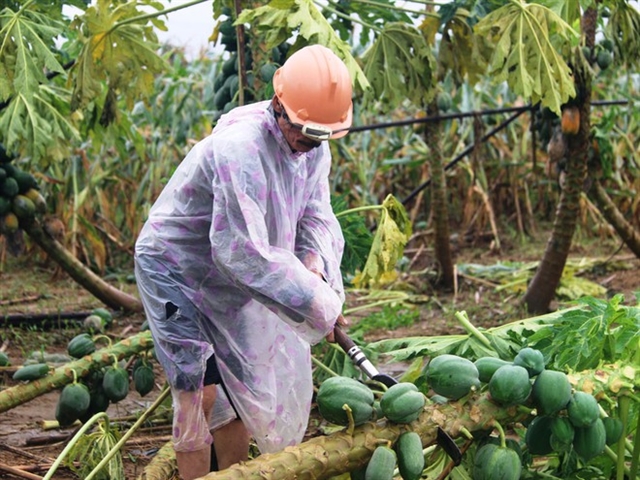 Society
Society


|
| Farmer Nguyễn Năm chops down hundreds of papaya trees destroyed by floods last month. — Photo thanhnien.vn |
QUẢNG NAM — After felling 300 papaya trees in his farm, Nguyễn Năm, a 60-year-old farmer in Đại Lộc District, central Quảng Nam Province, does not want to think about the historic floods that lashed the region last month.
In mid-October, two weeks from the papaya harvest, torrential rain and heavy floods hit the central localities, blowing off roofs, damaging houses and washing away hundreds of hectares of fruits and vegetables in Bầu Tròn Village, one of Quảng Nam’s largest vegetable-growing areas which supplies farm produce to the province and Đà Nẵng City.
“This is a big property for farmers. We spent a lot of years growing plants and now see them lying on the soil, covered with mud,” Năm told Thanh niên (Young People) newspaper.
Instead of harvesting fruits and vegetables to prepare for new year consumption, more than 300 farming households in Đại Lộc District are now cleaning their gardens which cover more than 40ha.
Hundreds of hectares of squashes, papayas, cucumbers, bitter melons and green beans planted for the lunar new year season were destroyed.
In his 20 years of growing vegetables, Bá Tâm, a 51-year-old farmer in Đại An Commune, had never before seen 5,000sq.m of bitter melons washed away.
His family borrowed money to invest millions of đồng into the farm and lost everything.
“Farmers like us do not have enough money to spare comfortably. Millions of đồng is a lot to us. I hoped to earn from the farm to cover tuition fees for my children and prepare for Tết (Lunar New Year). But now we are empty-handed,” Tâm said.
According to Đại Lộc District’s Agriculture and Rural Development Department, nearly 800ha of fruits and vegetables were destroyed by prolonged and severe rain and floods. Local authorities have assisted farmers to recover from losses.
Many farmers tried to forget the heavy losses and started to sow the seeds from scratch. This time they selected short-term vegetables to grow and sell before Tết.
Lê Tuấn, a farmer in Đại Cường Commune, said the biggest difficulty for farmers now was seed supplies and resources to invest in production.
“Besides small areas of farms having newly-sowed seeds, dozens of hectares of land in Bàu Tròn are still left empty. The prices of fruits and vegetables declined sharply after two waves of COVID-19. We thought we could recover when the pandemic was over but then we hard-hit by storms and floods. We lost everything,” Tuấn said.
Mai Văn Toàn, a farmer of La Hường vegetable-growing area in Cẩm Lệ District, central Đà Nẵng City, is growing short-term vegetables to meet market demand ahead of the new year.
Normally the end of the 10th lunar month is the time to sow vegetable seeds for Tết. But this year's prolonged rain and flood resulted in a serious shortage of clean vegetables. Traders in many places urgently asked farmers for a clean source of vegetables.
Farmers in La Hường have to take risks to grow short-term vegetables like water spinach, amaranth and Malabar spinach to sell to supermarkets, he said.
“We started to sow the seeds for Tết but feel worried mother nature will get angry again bringing more unusual rain and floods.” — VNS




